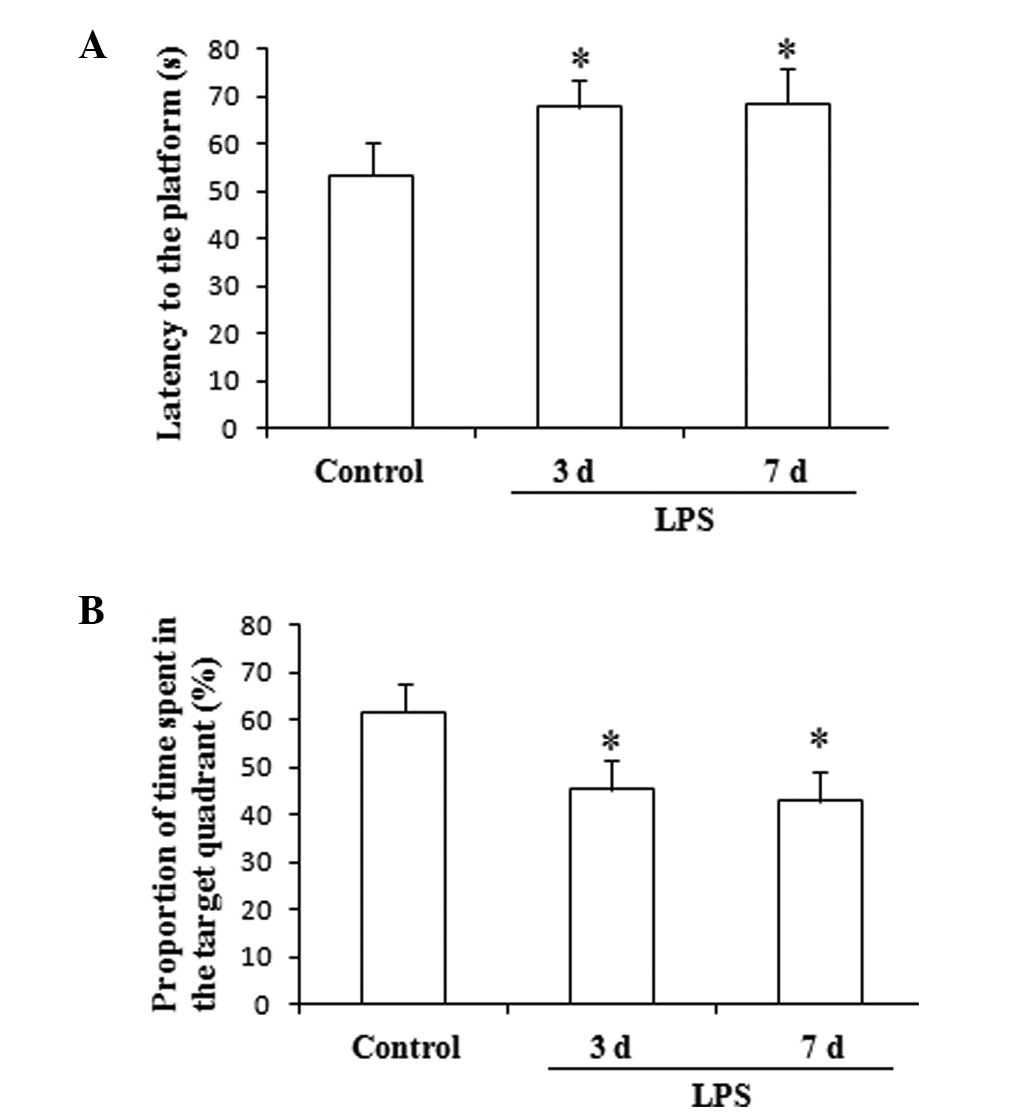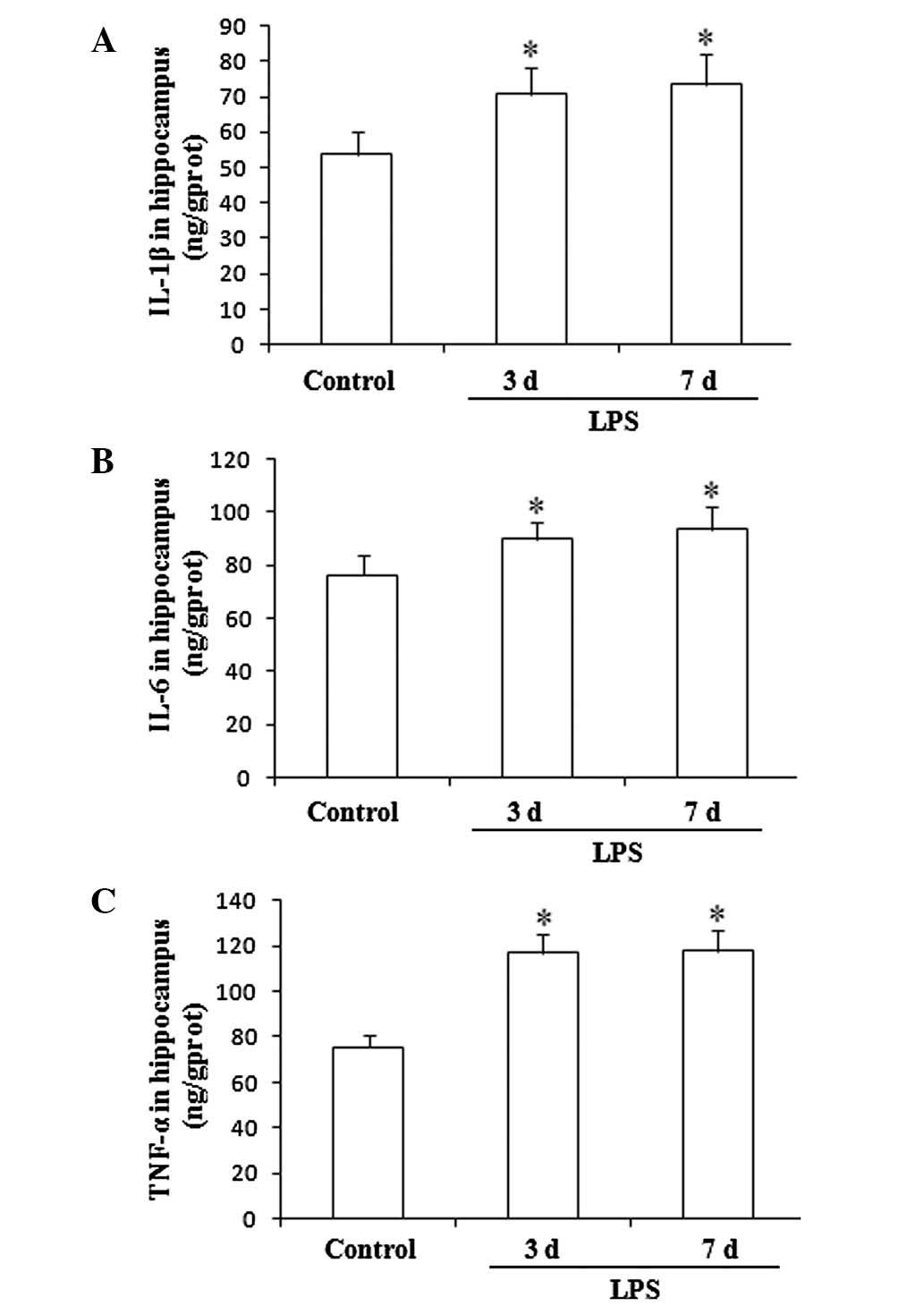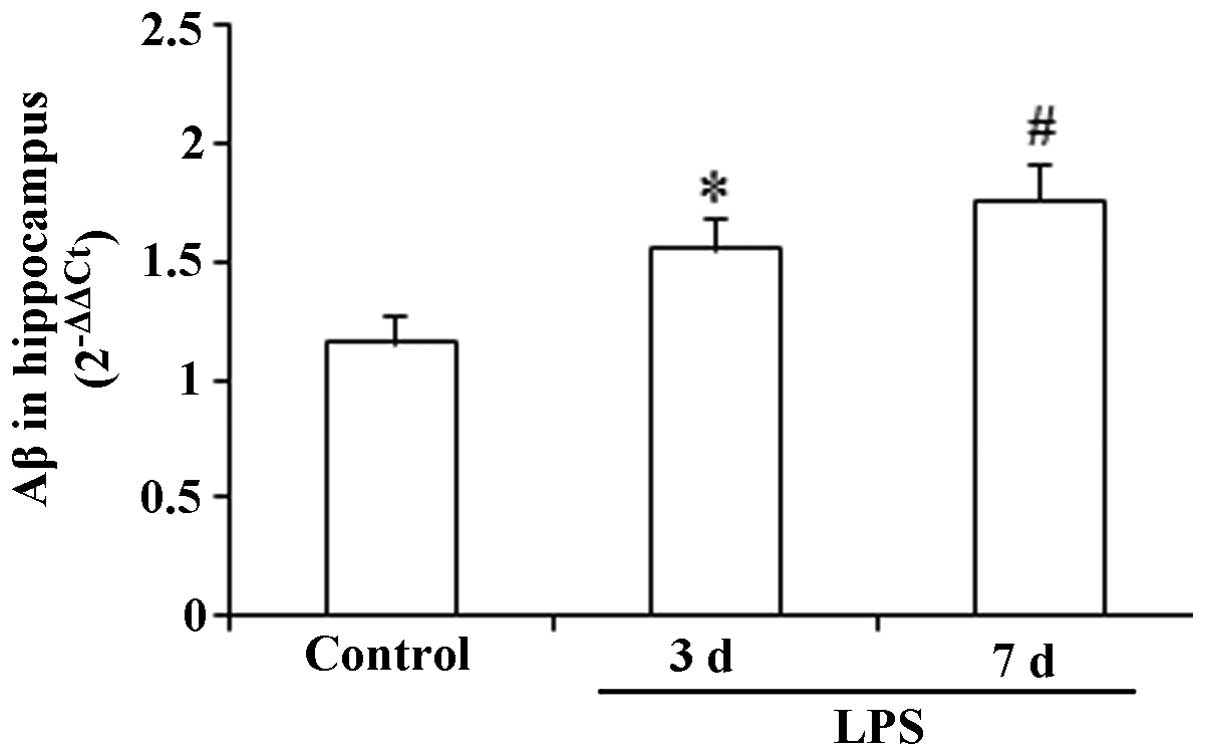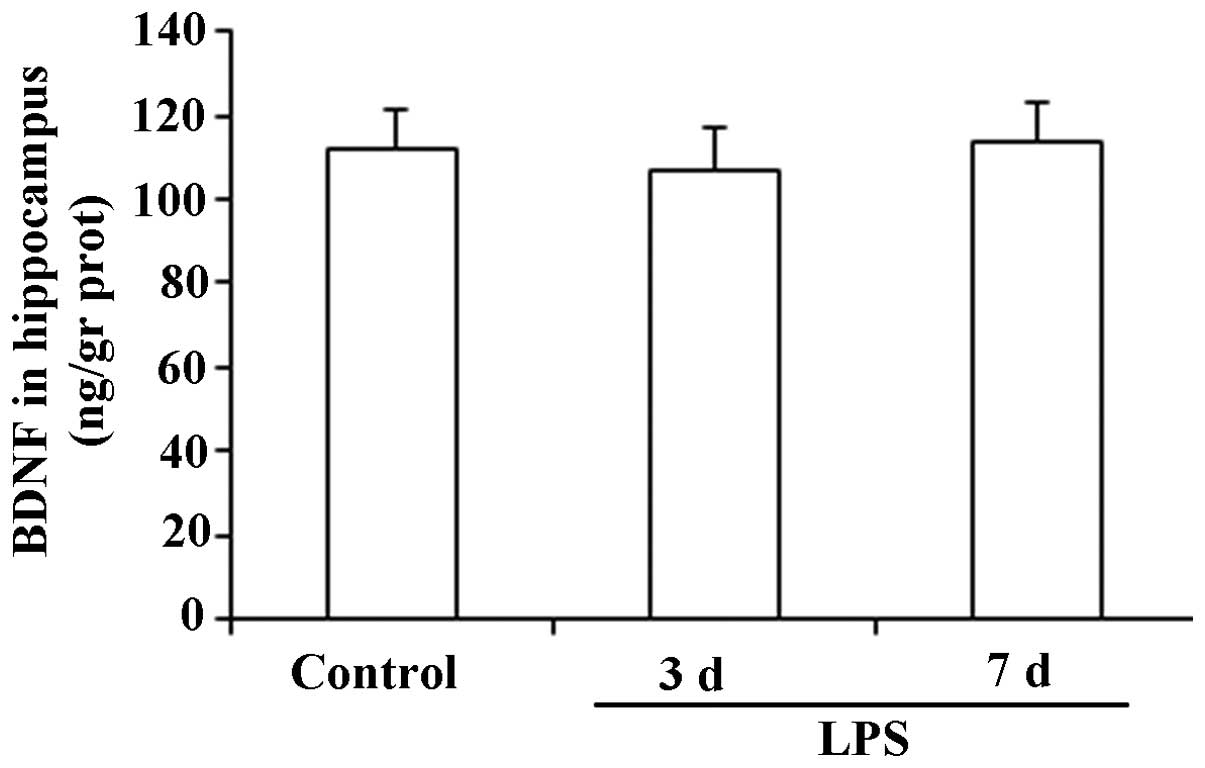|
1
|
Adam N, Kandelman S, Mantz J, Chrétien F
and Sharshar T: Sepsis-induced brain dysfunction. Expert Rev Anti
Infect Ther. 11:211–221. 2013. View Article : Google Scholar
|
|
2
|
Zampieri FG, Park M, Machado FS and
Azevedo LC: Sepsis-associated encephalopathy: not just delirium.
Clinics (Sao Paulo). 66:1825–1831. 2011. View Article : Google Scholar : PubMed/NCBI
|
|
3
|
Guan Z and Fang J: Peripheral immune
activation by lipopolysaccharide decreases neurotrophins in the
cortex and hippocampus in rats. Brain Behav Immun. 20:64–71. 2006.
View Article : Google Scholar : PubMed/NCBI
|
|
4
|
Suzumura A, Takeuchi H, Zhang G, Kuno R
and Mizuno T: Roles of glia-derived cytokines on neuronal
degeneration and regeneration. Ann NY Acad Sci. 1088:219–229. 2006.
View Article : Google Scholar : PubMed/NCBI
|
|
5
|
Wang Y, Cui XL, Liu YF, et al: LPS
inhibits the effects of fluoxetine on depression-like behavior and
hippocampal neurogenesis in rats. Prog Neuropsychopharmacol Biol
Psychiatry. 35:1831–1835. 2011. View Article : Google Scholar : PubMed/NCBI
|
|
6
|
Deng XH, Ai WM, Lei DL, Luo XG, Yan XX and
Li Z: Lipopolysaccharide induces paired immunoglobulin-like
receptor B (PirB) expression, synaptic alteration, and
learning-memory deficit in rats. Neuroscience. 209:161–170. 2012.
View Article : Google Scholar : PubMed/NCBI
|
|
7
|
Richwine AF, Sparkman NL, Dilger RN,
Buchanan JB and Johnson RW: Cognitive deficits in
interleukin-10-deficient mice after peripheral injection of
lipopolysaccharide. Brain Behav Immun. 23:794–802. 2009. View Article : Google Scholar : PubMed/NCBI
|
|
8
|
Sparkman NL, Buchanan JB, Heyen JR, Chen
J, Beverly JL and Johnson RW: Interleukin-6 facilitates
lipopolysaccharide-induced disruption in working memory and
expression of other proinflammatory cytokines in hippocampal
neuronal cell layers. J Neurosci. 26:10709–10716. 2006. View Article : Google Scholar
|
|
9
|
Dantzer R, O’Connor JC, Freund GG, Johnson
RW and Kelley KW: From inflammation to sickness and depression:
when the immune system subjugates the brain. Nat Rev Neurosci.
9:46–56. 2008. View
Article : Google Scholar : PubMed/NCBI
|
|
10
|
Smith CJ, Emsley HC, Udeh CT, et al:
Interleukin-1 receptor antagonist reverses stroke-associated
peripheral immune suppression. Cytokine. 58:384–389. 2012.
View Article : Google Scholar : PubMed/NCBI
|
|
11
|
Krzyszton CP, Sparkman NL, Grant RW, et
al: Exacerbated fatigue and motor deficits in
interleukin-10-deficient mice after peripheral immune stimulation.
Am J Physiol Regul Integr Comp Physiol. 295:R1109–R1114. 2008.
View Article : Google Scholar : PubMed/NCBI
|
|
12
|
Johnston H, Boutin H and Allan SM:
Assessing the contribution of inflammation in models of Alzheimer’s
disease. Biochem Soc Trans. 39:886–890. 2011.PubMed/NCBI
|
|
13
|
Kaster MP, Gadotti VM, Calixto JB, Santos
AR and Rodrigues AL: Depressive-like behavior induced by tumor
necrosis factor-α in mice. Neuropharmacology. 62:419–426. 2012.
|
|
14
|
Mansur RB, Zugman A, Asevedo EM, da Cunha
GR, Bressan RA and Brietzke E: Cytokines in schizophrenia: possible
role of anti-inflammatory medications in clinical and preclinical
stages. Psychiatry Clin Neurosci. 66:247–260. 2012. View Article : Google Scholar : PubMed/NCBI
|
|
15
|
Pizza V, Agresta A, D’Acunto CW, Festa M
and Capasso A: Neuroinflamm-aging and neurodegenerative diseases:
an overview. CNS Neurol Disord Drug Targets. 10:621–634. 2011.
View Article : Google Scholar : PubMed/NCBI
|
|
16
|
Magaki S, Mueller C, Dickson C and Kirsch
W: Increased production of inflammatory cytokines in mild cognitive
impairment. Exp Gerontol. 42:233–240. 2007. View Article : Google Scholar : PubMed/NCBI
|
|
17
|
Oral E, Canpolat S, Yildirim S, Gulec M,
Aliyev E and Aydin N: Cognitive functions and serum levels of
brain-derived neurotrophic factor in patients with major depressive
disorder. Brain Res Bull. 88:454–459. 2012. View Article : Google Scholar : PubMed/NCBI
|
|
18
|
Zhang XY, Liang J, Chen da C, et al: Low
BDNF is associated with cognitive impairment in chronic patients
with schizophrenia. Psychopharmacology (Berl). 222:277–284. 2012.
View Article : Google Scholar : PubMed/NCBI
|
|
19
|
D’Hooge R and De Deyn PP: Applications of
the Morris water maze in the study of learning and memory. Brain
Res Brain Res Rev. 36:60–90. 2001.PubMed/NCBI
|
|
20
|
Solov’eva T, Davydova V, Krasikova I and
Yermak I: Marine compounds with therapeutic potential in
gram-negative sepsis. Mar Drugs. 11:2216–2229. 2013.PubMed/NCBI
|
|
21
|
Skelly DT, Hennessy E, Dansereau MA and
Cunningham C: A systematic analysis of the peripheral and CNS
effects of systemic LPS, IL-1β, TNF-α and IL-6 challenges in
C57BL/6 mice. PLoS One. 8:e691232013.PubMed/NCBI
|
|
22
|
Shaw KN, Commins S and O’Mara SM:
Lipopolysaccharide causes deficits in spatial learning in the
watermaze but not in BDNF expression in the rat dentate gyrus.
Behav Brain Res. 124:47–54. 2001. View Article : Google Scholar : PubMed/NCBI
|
|
23
|
Leung R, Proitsi P, Simmons A, et al:
Inflammatory proteins in plasma are associated with severity of
Alzheimer’s disease. PLoS One. 8:e649712013.
|
|
24
|
Reale M, Iarlori C, Gambi F, et al:
Treatment with an acetylcholinesterase inhibitor in Alzheimer
patients modulates the expression and production of the
pro-inflammatory and anti-inflammatory cytokines. J Neuroimmunol.
148:162–171. 2004. View Article : Google Scholar
|
|
25
|
Hsu LJ, Mallory M, Xia Y, et al:
Expression pattern of synucleins (non-Abeta component of
Alzheimer’s disease amyloid precursor protein/alpha-synuclein)
during murine brain development. J Neurochem. 71:338–344. 1998.
|
|
26
|
Nguyen JT, Yamani A and Kiso Y: Views on
amyloid hypothesis and secretase inhibitors for treating
Alzheimer’s disease: progress and problems. Curr Pharm Des.
12:4295–4312. 2006.PubMed/NCBI
|
|
27
|
Yan Q, Rosenfeld RD, Matheson CR, et al:
Expression of brain-derived neurotrophic factor protein in the
adult rat central nervous system. Neuroscience. 78:431–448. 1997.
View Article : Google Scholar : PubMed/NCBI
|
|
28
|
Lapchak PA, Araujo DM and Hefti F:
Systemic interleukin-1 beta decreases brain-derived neurotrophic
factor messenger RNA expression in the rat hippocampal formation.
Neuroscience. 53:297–301. 1993. View Article : Google Scholar
|
|
29
|
Maher FO, Martin DS and Lynch MA:
Increased IL-1beta in cortex of aged rats is accompanied by
downregulation of ERK and PI-3 kinase. Neurobiol Aging. 25:795–806.
2004. View Article : Google Scholar : PubMed/NCBI
|
|
30
|
Taishi P, Churchill L, De A, Obal F Jr and
Krueger JM: Cytokine mRNA induction by interleukin-1beta or tumor
necrosis factor alpha in vitro and in vivo. Brain Res. 1226:89–98.
2008. View Article : Google Scholar : PubMed/NCBI
|
|
31
|
Schnydrig S, Korner L, Landweer S, et al:
Peripheral lipopolysaccharide administration transiently affects
expression of brain-derived neurotrophic factor, corticotropin and
proopiomelanocortin in mouse brain. Neurosci Lett. 429:69–73. 2007.
View Article : Google Scholar
|


















